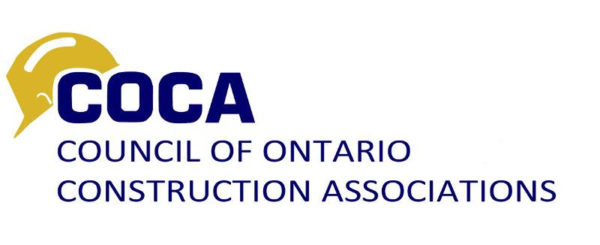
Construction in Ontario Newsletter – January 2018 Edition
Read the complete Construction in Ontario newsletter here. 
Greetings!
The Council of Ontario Construction Associations (COCA) is a federation of construction associations; the largest and most representational group of industrial, commercial and institutional (ICI) and heavy civil construction employers in Ontario. Our member organizations represent more than 10,000 construction businesses and more than 400,000 employees.
- G-723-04, Asbestos Abatement
- G-707-05, Industrial Maintenance and Repair Contracting
- G-704-02, Testing, Inspection, and Related Services
- G-748-06, Above Ground Window Cleaning
- G-704-03, Office Furniture Installation
- G-737-04, Custom Welding Services
- The Bill 119 amendments to the Workplace Safety and Insurance Act will no longer apply to these employers. Their executive officers (EOs) will no longer have to be covered, and can apply to stop paying premiums. Independent operators (IOs) who perform these business activities no longer need mandatory coverage, and can apply to opt out.
- These employers will now fall under the non-construction rules for re-employment and return to work and as a consequence their re-employment and return to work obligations will change Those employers who have fewer than 20 workers will no longer have mandatory re-employment obligations.
The experience rating program for these employers will very likely change from CAD-7 to NEER
The Counsel and Co-counsel for the highly successful review that led to Bill 142, Construction Lien Amendment Act, 2017, Bruce Reynolds and Sharon Vogel, have left Borden Ladner Gervais LLP (BLG) and joined the British Columbia-based firm Singleton Urquhart to form Singleton Urquhart Reynolds Vogel LLP.
The firm will operate under the name Singleton Reynolds. With 53 lawyers, the firm describes itself as a leader in construction, insurance, infrastructure, real estate and business law.
On its website, only Reynolds, Vogel, James Little (also a former BLG lawyer who supported Reynolds and Vogel in their review and also a newcomer to the firm), and Peter Wardle (who joined the firm at the same time as Reynolds, Vogel and Little after his former firm, Wardle Daley Bernstein Bieber LLP closed) have Ontario telephone area codes so it appears that they are opening up the firm’s practice in this province.


